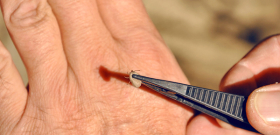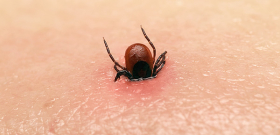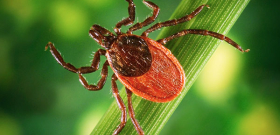
Tick bites are one of the dangers that lie in wait for a person in nature. Moreover, today this threat is actively migrating from truly wild places to the urbanized environment: people report attacks of these parasites in city parks, yards, dachas and vegetable gardens. Moreover, in some areas, in terms of their danger, such bites are quite comparable with a serious illness or accident. So, insurance against a tick can be quite appropriate here, or rather, what is meant by such insurance.
The fact is that no insurance, of course, guarantees protection against the tick bite itself, just as fire insurance does not guarantee that the house will not burn down. Moreover, if we are talking about property insurance, then it is quite possible to compensate for it with an insurance payment. But the threat to health, including from a tick bite, insurance is not always able to cover.
Practice shows that the better a person understands what kind of threat ticks pose to him, the better he understands the biology of these parasites and the specifics of the diseases they carry, the less likely he will take out such insurance. Experienced travelers, tourists, hunters and fishermen, as well as scientists who study ticks and the infections they carry, almost never take out such insurance.And the main buyers of these policies are people who are relatively rarely in nature. Why? Let's figure it out.
Do you need insurance?
Without a doubt, insurance will really come in handy in the event that a tick bites an insured person, infects him with an infection, and this infection causes a disease. But if you understand the specifics of these diseases, then the rationality of such insurance will no longer seem so unambiguous.
In Russia, Ukraine and Kazakhstan, two significant diseases that can be contracted from a tick bite are tick-borne encephalitis and borreliosis. It is impossible to say exactly what is the probability of getting at least one of these diseases after a tick bite.
According to statistics, even in regions dangerous for encephalitis, an average of 6% of ticks are infected with encephalitis. Studies show that after the bites of ticks in whose organisms this infection was found, an average of 4% of people fall ill. That is, the probability that tick-borne encephalitis will develop in a dangerous region after a single tick bite is approximately 0.24% (24 cases of disease development per 10,000 bites, or 1 disease per 416 bites).
Standard payments under insurance policies against tick bites are approximately 100-150 thousand rubles. This is a significant amount for most people, however, for it to be required, an average person must be bitten by 416 ticks. Agree, few people are so careless in nature that they will allow themselves to be bitten by so many ticks in their entire lives.
At the same time, insurance does not guarantee a successful cure for encephalitis. At least because there are no methods for a guaranteed complete cure for this disease today.Its causative agent is a viral infection, against which etiotropic drugs have not been developed, that is, there are no drugs that are guaranteed to suppress this infection in the body. This means that even fully paid treatment does not always end successfully.
That is why if a person has a risk of picking up an encephalitis tick, it is more expedient for him to be vaccinated against encephalitis. It gives a reliable guarantee that after a bite the disease will either not develop at all, or even during development it will proceed in a mild, blurred form and end without consequences.
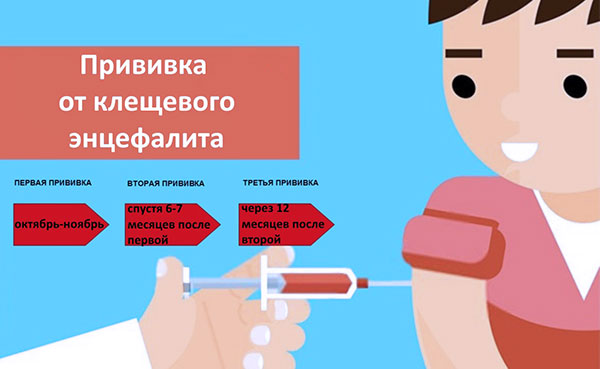
Vaccination schedule against tick-borne encephalitis.
Obviously, if you have such a vaccination, insurance is not required.
Consequently, the likelihood that insurance will be useful to a person who rarely visits nature in a region dangerous for encephalitis is extremely small. But it does not provide reliable protection against the consequences of the disease. For people who, on duty or hobbies, are often forced to visit the wild, it is more expedient to simply get vaccinated and not worry about encephalitis at all.
The specificity of tick-borne borreliosis is somewhat different. Infection with this disease occurs somewhat more often than encephalitis, due to its greater prevalence.
So, if an average of 0.53% of those bitten get sick with encephalitis because of a tick bite, then about 1.5% become infected with borreliosis. However, if borreliosis is diagnosed on time, in the early stages, and treated correctly, then such treatment is inexpensive: it is carried out on an outpatient basis using quite affordable antibiotics. Its costs are:
- One consultation with an infectious disease specialist (by law, free of charge, in fact, the doctor is “left” 150-200 rubles);
- Blood test for borreliosis (within 300-400 rubles in a state clinic, 800-1300 rubles in private clinics of the Invitro level);
- 10 tablets of doxycycline (cost about 30 rubles per pack).
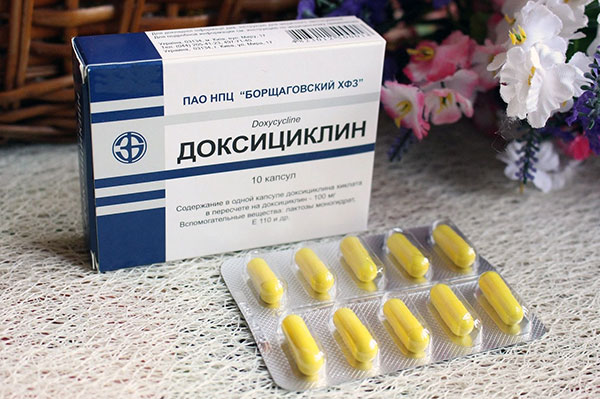
An antibiotic prescribed in the treatment of tick-borne borreliosis.
In total, it comes out 480-1600 rubles. It may seem that all the same, insurance costs less, and the amount of coverage will significantly exceed these costs. But here, again, it is worth remembering the meager probability that those 1-2 ticks that can bite an ordinary city dweller in nature in the summer season will be carriers of borreliosis.
On a note
Based on statistics, a person needs to buy an average of 174 insurance policies in order for one of them to be useful for the treatment of borreliosis. The cost of these insurances will be dozens of times higher than the cost of competent treatment of Lyme disease once in a lifetime.
If treatment starts too late (due to diagnostic errors or violations of therapy rules), then insurance is either not paid at all due to the expiration of the policy, or the insurance payment turns out to be insignificant compared to the amounts that the patient will have to spend with the development of chronic incurable complications.
Simply put, it is more reliable to protect yourself from encephalitis by vaccination than to count on insurance and be treated with it at the risk of life, and Lyme borreliosis is cheaper to cure when it develops than to regularly purchase a policy for insurance against it.
But even more importantly, the standard CHI policy fully covers all costs for the treatment of tick-borne infections.
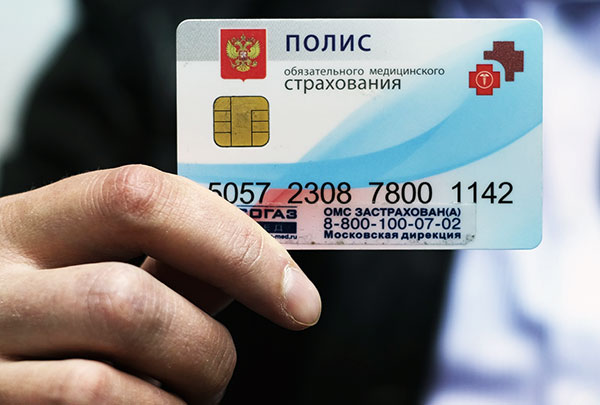
Having a compulsory health insurance policy will help cover the cost of treatment for the effects of a tick bite.
Since most Russian citizens have such an insurance policy, it makes no sense to purchase tick insurance in addition to it. Of all the procedures necessary for the diagnosis and treatment of tick-borne infections, only the cost of examining a tick for the presence of infections in it is not covered by the CHI policy. Such a study, together with blood sampling from a vein, even in expensive private clinics, costs about 700-800 rubles. Is it worth buying insurance for 150-180 rubles in order to cover these costs from it when a tick bites?
Finally, the most important point: people who often and for a long time in wild places observe protective measures that very reliably prevent attacks and tick bites. As a result, ticks bite such experienced naturalists even less often than people who go out on a picnic once a year and do not even know how to behave here so as not to pick up a parasite.
It can be concluded that tick insurance is issued more often not for reasons of safety and rationality, but simply out of fear and ignorance. It is also impossible not to admit that often such policies are sold "as a load" for various services, and people do not pay attention to their relatively low cost. As a result, there is a demand for such insurance and it will be useful to know what you can count on with them.
Services and expenses covered by the insurance policy
Standard special tick insurance covers all costs that the bitten person incurs for the diagnosis and treatment of the disease. In particular, the amount of insurance coverage is calculated based on the following set of paid services:
- Removing a tick in a clinic or emergency room. In public clinics, this service is free, in private clinics it is paid and costs 200-300 rubles.If the policy is valid in a specific private clinic, then the removal of the tick in it will be paid from the insurance payment;
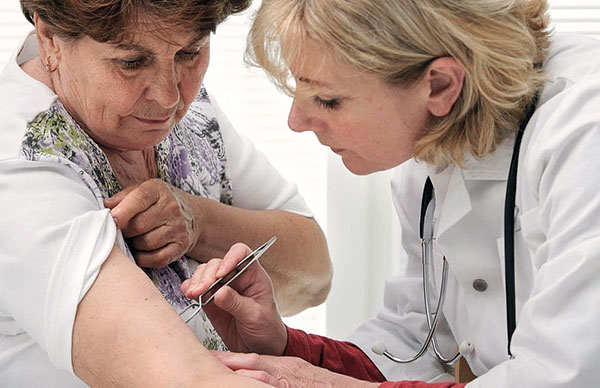
Assistance in tick removal in public medical institutions is free.
- Tick analysis for tick-borne encephalitis or borreliosis. In state laboratories at hospitals, the cost of checking for encephalitis is 250-400 rubles, separately for borreliosis - the same amount, a comprehensive analysis - 500-600 rubles. Tick insurance covers the cost of this service, but the standard CHI policy does not. In fact, this is the only reason for acquiring insurance for people with a formalized MHI agreement;
- Emergency prevention of tick-borne encephalitis when a virus is detected in the tick's body. With borreliosis, it is not carried out;
- Hospitalization with the development of encephalitis or a severe form of borreliosis, outpatient treatment of mild forms of borreliosis;
- Rehabilitation after treatment, treatment of complications caused by tick-borne infection.
Each insurance may have nuances: in some, the removal of a tick or its examination is not paid (which, in fact, does not distinguish them from compulsory medical insurance), in others, the list of medical institutions in which treatment is covered by this insurance is somehow limited, separate policies have strict geographic restrictions. All these nuances must be taken into account, and it is not always easy to do this at the time of registration of insurance. For example:
- A tourist takes out insurance before a long difficult trip, a tick bites him on the first day of the trip and the disease develops on the 8-9th day. Urgent hospitalization of the victim, located in a remote, inaccessible area, is required.In this case, the most expensive part of the operation - the evacuation of the tourist from the route - will not be covered by insurance, since it is not included in the list of covered services and costs more than the amount of coverage;
- Insurance is issued on the eve of a trip to nature (for example, to a summer cottage), the next day a person is bitten by a tick, he goes to the clinic, but the services of the clinic are not covered by the policy, since it comes into force only 5 days after registration;
- A clinic that provides certain services in a particular city is not included in the list of institutions of a particular policy. Consequently, the bitten person will have to pay for the services of this clinic out of his own pocket. Or vice versa, a clinic in a particular locality with which a particular insurance company cooperates may not provide certain services - for example, they do not remove ticks or do not examine them for infections. A person will have to do this in other institutions at their own expense.
From this, at least, we can draw an important conclusion: you need to purchase insurance after a thorough study of its conditions, including those written in small print at the bottom of the policy or on additional pages. That is, you need to prepare for the registration of such insurance in advance and certainly not to issue it in a hurry, buying the first thing that the nearest bank or insurance company offers.
On a note
It is very difficult to get insurance against tick infections for a pet. Firstly, it is more likely to be infected, and secondly, treatment can be even more difficult and expensive, especially for piroplasmosis in dogs. Therefore, very few insurance companies develop such programs at more or less affordable prices.
What kind of insurance options are there, in particular, in Russia, how to evaluate and compare them with each other? Let's look at examples.
Companies and banks offering tick insurance
Almost all insurance companies and large banks that work with private clients offer their own insurance options in case of a tick bite. The most popular among them:
- "Insurance against tick bites" from Rosgosstrakh. The cost of the policy for one person for 1 year is 470 rubles. Due to the wide popularity of the insurance program itself, a large number of people use this program, which is why it has a large number of both positive and negative reviews. As of December 2019, ordering and paying for this policy on the Rosgosstrakh website were unavailable;
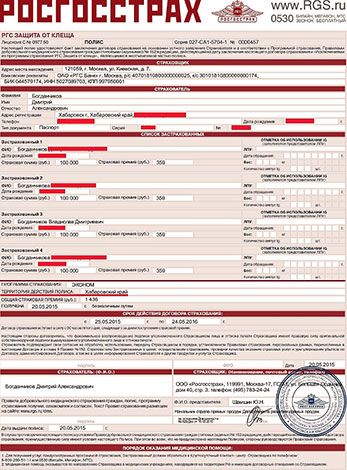
This is how the insurance policy "Insurance against tick bites" from the Russian State Insurance Company looks like.
- Polis Antiklesch from SC Nadezhda. The price depends on the package of services, the minimum cost is 250 rubles. First of all, it is attractive because the company operates mainly in Siberia and the Far East, the main office is located in Krasnoyarsk - thanks to this, the policy takes into account the features of most cities and medical institutions located precisely in regions dangerous for encephalitis;
- AlfaKleshch policy from Alfastrakhovanie. It is interesting in that at a relatively low cost (380 rubles for a 30-year-old resident of Krasnoyarsk) it provides coverage in the amount of 1 million rubles;
- Insurance "Antiklesch" from VSK. It is notable for serious regional restrictions - the policy is valid only in areas recognized as endemic by Rospotrebnadzor;
- "Person Antiklesch" from Sogaz is one of the most expensive.For a 30-year-old buyer, a contract with a coverage amount of 50,000 rubles will cost 550 rubles, and for an amount of 100,000 - already 1,100 rubles.
The main data for the various proposals are summarized in the table below:
| Company | Program | Age of the insured | Price (or price range), rub | Coverage (or range), rub | Validity | Entry into force of the policy |
| Rosgosstrakh | Tick bite insurance | 0-75 years old | 300-1250 | 100-500 thousand | 1 year | Specified at checkout |
| Hope | Antiklesh | 250-1400 | 50-150 thousand | 1 year | 5 days | |
| Alpha insurance | AlphaMite | Without Borders | 190 - children from 240 - adults | 1000000 | 1 year | 5 days |
| VSK | Antiklesh | 1-75 years old | 1 year | 3 days | ||
| Sogaz | Person Antiklesh | 0-81 years old | 420-7000 | 300 000 — 500 000 | 1 year | |
| VTB | Tick bite insurance | Any | 220-300 | 100 000 | 3-9 months | |
| Sberbank | Tick Protection | 3-65 years old | 470 | 100 000 | 1 year | 6 business day |
| RESO | 200-500 | 200 - 500 thousand | ||||
| Ingosstrakh | Antiklesh | Without Borders | 250 | 1000000 | 1 year | |
| Astra-Metal | Without Borders | 100-600 | 100 thousand - 2.5 million | 1 year |
Other companies insure customers under similar conditions: Energogarant, Yuzhuralasko, Simaz Med, Uralsib Bank, Vyatka Bank, Yugoria, Tinkoff Insurance, Renaissance and others. The policies of some of them apply only to certain regions, while others work throughout Russia.
Many of these insurances can be obtained from agents, or from organizations cooperating with several companies at once. For example, at the Russian Post office, you can choose and issue a policy from Rosgosstrakh, VTB, VSK and other insurers.

An insurance policy from many insurance companies can also be issued at the branches of the Russian state company Russian Post.
As a rule, the prices for children's insurance under all programs are lower than the prices for adults.Also, when issuing a policy for all family members, insurers usually offer certain discounts, and sometimes when insuring the whole family, children's policies up to a certain age are issued free of charge. At the same time, specific conditions are constantly being reviewed and changed, and therefore they should be clarified immediately before applying for insurance.
It is important to remember only the nuance that the policy does not take effect immediately. This means that it will not work, firstly, to come to the insurance company with a tick already attached under the leg, get a policy, then take the tick for analysis, undergo treatment and receive compensation, and secondly, it will not be possible to issue a policy today and with a calm heart to go on a picnic tomorrow.
Also, before paying for the policy, you should always check the list of medical institutions where treatment under this insurance is possible, and the possibility of receiving certain services in these clinics. Reviews are very common about how people could not receive certain services in clinics that were covered by a particular policy.
Review
Never again will I issue a policy in Rosgosstrakh. Disgusting service, disgusting quality of service, no care for the insured. I insured the whole family, it turned out 1700 rubles for four. We decided to insure ourselves against ticks, because we regularly began to visit the country house, plus the small one went to the camp. As promised, everything is just wonderful. But in fact ... The son brought a tick on his leg straight from the walk. I call the phone number indicated in the policy, listen to music for 6 minutes, the operator answers. I ask: which hospital should I take the Kinder to be removed and submitted for analysis. Offers to switch me to a doctor. What for? Unclear. I'm waiting. I can't stand it. I'm dropping. I call back. Another operator says the same.I start to get angry, I explain that I have not been connected once. She, like a robot, replies that all operators are busy. Switches to the doctor. Listen to music. The doctor answers, 80 years old by voice. He says, look on the Internet, in which clinic in your city they extract ticks. I can’t stand it, I start yelling at her, I say that I didn’t buy a policy in order to look for addresses on the Internet. Promises to find out and call back. Call in 2 hours (!). He says, write the address: Krasnoyarsk... What Krasnoyarsk, I am in Novosibirsk. They leave to search in Novosibirsk. They call in half an hour. They give you an address and a phone number. I call the clinic, they cheerfully tell me that they don’t extract ticks and don’t conduct research, and according to insurance, immunoglobulin is administered only according to a letter from the insurance company. I call the RGS, cursing everyone, asking why the covered extraction and research services are indicated in the policy, in fact they are not. They snap, send a letter in half an hour to ... what do you think? Tick extraction and research that no one in their clinic does! Well, not people, but idiots! I call again, I get to the first operator, I swear, they switch me to a doctor, yell at her. They send me a letter for the introduction of immunoglobulin. I curse, I remove it from a small tick myself, I throw it into a jar, we go to the clinic, we still have time before the laboratory assistant leaves, the child is injected with immunoglobulin. This is in violation of all instructions, without the results of the analysis of the tick! And only tomorrow I will take the tick for analysis, and at my own expense, because Rosgosstrakh does not work with the laboratory in Novosibirsk, where this analysis is carried out. In general, if you need tick bite insurance, choose anything other than CGS. We next year will do in Kolyma.
Pavel, Novosibirsk
Rules of conduct of the insured in the event of an insured event
The issued policy clearly states what is an insured event in this case. As a rule, in most situations it is a tick bite, less often - only a disease caused by a tick infection, for a number of insurance companies - both.
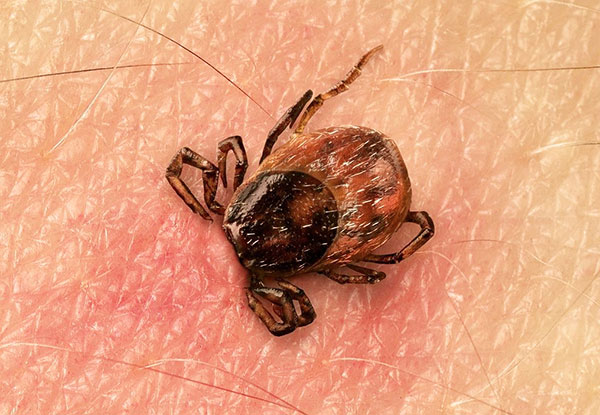
For most insurance companies, only tick sucking is an insured event.
Depending on the conditions of insurance, the insurance company can either pay for the costs associated with removing the tick, testing it for infections and subsequent prevention and treatment, or provide all this service for free if the bitten person has a policy or a letter of guarantee.
If the service is carried out under the policy, then it is enough for a person to contact any medical institution indicated in the policy itself, provide it and receive the necessary services. If certain services (for example, tick removal) are carried out in a separate emergency room, then the clinic will be sent to the one with which the particular insurance company works.
If services are provided with a letter of guarantee, then upon the occurrence of an insured event, you must call the call center of the insurance company and request such a letter. Usually it is sent within 1-2 hours by e-mail.
On a note
It is important to understand the difference between activating a policy and applying for an insured event. The activation of the policy occurs after it is received by the insured, and the moment of its activation is considered the moment the insurance itself begins to operate. The appeal to the insurance company upon the occurrence of an insured event occurs at any time during the period of validity of the policy, but only after the policy has been activated.Many insurance companies can order, pay and activate the policy online, without visiting the office and communicating with agents.
If the insurance covers the costs of the insured, he must keep all the checks received at the clinic, emergency room and laboratory, and then submit them to the insurance company for reimbursement.
In the general case, the procedure for a tick bite should be as follows:
- The tick is removed on its own as early as possible - the sooner it is removed, the lower the risk of infection;
- The wound at the site of tick suction is treated with an antiseptic - iodine solution, "brilliant green", hydrogen peroxide;
- The tick is placed in a closed container, not crushed or killed, not filled with alcohol;
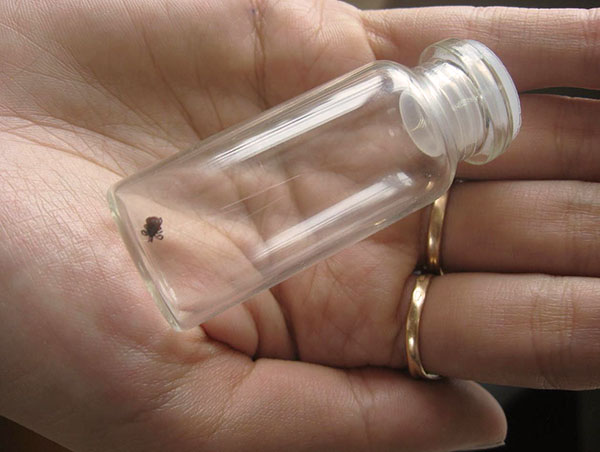
After removing the tick, it should be placed in a closed container for further examination.
- In the nearest pharmacy, a container is purchased for passing a urine test, a tick is placed in it;
- If the insurance provides for a letter of guarantee, the bitten person or his parents call the insurance company's call center and request such a letter;
- The tick is then sent to the laboratory for testing for infection. In the ideal case, an analysis is carried out for all infections, including Crimean Congo fever and ehrlichiosis, but in reality it is enough to study either only encephalitis, or encephalitis and borreliosis;
- After receiving the results of the analysis (usually the next day after the delivery of the tick), it is considered by an infectious disease doctor;
- If the tick is infected with encephalitis, immunoglobulin is administered to the bitten as an emergency preventive measure. If the disease develops in the future, the patient goes to the hospital for treatment;
- If the tick is infected with borreliosis, the patient is either prescribed treatment after the onset of symptoms of the disease, or he donates blood for analysis after 1 month to determine the presence of antibodies to borreliosis. Based on the results of this analysis, the doctor makes certain appointments;
- If the policy covers the costs of already made payments, then at the end of treatment or prevention, all received checks are sent to the insurance company, and she makes a payment to the account of the insured.
Policies with a large amount of coverage (more than 500,000 rubles) usually provide for the procedure for paying for services also related to rehabilitation treatment, compensation for the development of disability and incapacity for work, compensation to relatives after the death of the insured, if the cause of these situations was an infection transmitted by a tick after a bite precisely after insurance arrangements.
If the treatment costs exceed the sum insured, the insured person must pay the difference himself.
What to do if there is no insurance
And now let's calculate how it will happen and how much the standard treatment of tick-borne encephalitis and borreliosis will cost if there is no insurance and the bitten person pays for all services on his own. Officially, these services are free in Russia and other countries of the post-Soviet space, in fact, all of them are paid voluntarily or according to a price list tacitly established in a medical institution.
The sequence of actions in this case will be the same as indicated above, with the only difference being that it will not include steps related to interaction with the insurance company.
So, after detecting a tick that has already stuck to the skin:
- The bitten person or people near him remove the tick on their own as quickly as possible to reduce the risk of infection;
- Ticks in containers for testing are taken to the laboratory. A container for passing urine costs 15-20 rubles, a tick test for the presence of tick-borne encephalitis virus - about 400-700 rubles, depending on the clinic, an analysis for infection with borreliosis - the same amount, a comprehensive analysis will cost 500-1000 rubles;
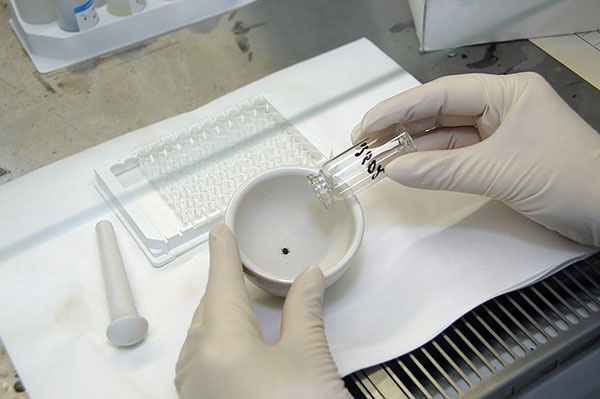
In the laboratory, the tick is examined for the presence of the tick-borne encephalitis virus and infection with Borrelia.
- The next day after the delivery of the tick, you can get the results of its study and take them to the infectious disease specialist. He interprets the result and will tell you if emergency encephalitis prophylaxis is required. A consultation with an infectious disease specialist costs, depending on the clinic, from 200 to 600 rubles;
- If the tick has been infected with the tick-borne encephalitis virus, the bitten person must be injected with specific immunoglobulin serum for emergency prevention of the disease. This is done no later than 4 days from the moment of the bite, and the sooner, the lower the risk of getting sick when infected. The cost of immunoglobulin is approximately 700-800 rubles per ampoule, the bitten drug is administered at the rate of 1 ampoule per 10 kg of weight. An adult man needs to enter about 8 ampoules (up to 6500 rubles). Additionally, the injection itself in the treatment room can cost 50-100 rubles;
- If the tick was infected with borreliosis, but the bitten person did not show signs of the disease, about a month after the bite, you will need to donate blood from a vein for analysis for the presence of antibodies to borrelias. The cost of such an analysis is about 400 rubles. Then - again a consultation with an infectious disease specialist, who, according to the results, will say whether the disease develops or not. This is another 200-600 rubles.
With the development of encephalitis or borreliosis, the costs will already be unpredictable. In the mildest case - a typical borreliosis with a short incubation period and unambiguous symptoms - the patient will need to buy an antibiotic (about 100-300 rubles), drink it and see an infectious disease specialist at least 2 times, and after a certain period of time, take a blood test again so that the doctor can make sure the disease is cured.
In more severe cases, resuscitation, the introduction of loading doses of immunostimulants, additional symptomatic treatment, prolonged hospital stay and rehabilitation treatment may be required. Sometimes the costs associated with it exceed the amount of insurance coverage, in some situations - many times over.
Nevertheless, such situations are quite rare, and arise, as a rule, due to negligence and violation of the rules for staying in nature in places dangerous for encephalitis. People who are puzzled by tick insurance usually behave prudently, take the necessary measures in time, and the situation does not develop to serious illnesses.
Is tick insurance mandatory and when can I refuse it?
By law, tick insurance can never be mandatory anywhere. A compulsory medical insurance policy is mandatory, which fully covers all costs associated with the treatment of tick-borne infections (except for the analysis of the tick itself for the presence of pathogens).
Nevertheless, private companies often force insurance against ticks when providing certain services.
For example, there are cases when, in order to issue a tourist voucher to Altai, the South Urals, Yakutia or the Far East, the tour operator required, among other documents, to provide a tick insurance policy.
Similarly, sometimes tick insurance is included in the list of mandatory documents for sending children to a summer camp, for organizing trips for hunting, fishing, and other outdoor activities. Although this is illegal, many clients (especially parents of children sent to the camp) prefer to buy a policy for little money and not conflict with the seller of services.

It is not uncommon for organizers to require insurance policies against tick bites when sending children to summer camps, but this is illegal.
There are also cases of outright "stealing" insurance against ticks. For example, it is often included additionally in DOSAGO, since compulsory OSAGO is unprofitable for most insurance companies. Sometimes such insurance is forced to be issued as a load when processing various travel and vacation documents, relying on the fact that the buyer simply does not notice it or does not attach importance to it.
Review
I always thought that insurance against a tick is something like insurance against a bull attack. Like, legal cover for a bribe. But recently I learned from an oil worker friend that they are all obliged to do such insurance before the shift. In my opinion, he works in the YaNAO, lives in Moscow. Here, without such insurance, you simply cannot leave for a watch, and even in winter, when there are no ticks in principle. There were even rumors that one of the guys caught encephalitis in the summer on exploration, in the taiga. So his legs were paralyzed, now he is disabled, but insurance covered all the treatment, he even received some kind of compensation for disability.
Sergey, St. Petersburg
Be that as it may, officially insurance against ticks can never be mandatory. If it is offered in combination with other documents, the consent of the insured must be for its execution. Otherwise, the imposition of such a service is illegal and you can safely refuse it.
Do insurance companies pay out under “anti-tick” policies
There are no unambiguous and complete statistics of payments and "non-payments" from insurance companies for insurance against ticks. However, there are many reviews from customers, according to which you can generally add up a fairly objective picture.
In general, in most cases, insurance companies diligently pay out insurance amounts when insured events occur. Moreover, the larger the company, the fewer cases of payment evasion in it. However, problems often arise in large companies. In particular, they may have poorly developed contacts with medical institutions in small towns, because of which clients have corresponding problems: the inability to receive part of the services under insurance, difficulties in interacting with the insurance itself in a given situation.
Payment problems can also arise if the disease is not uniquely related to the tick bite. For example, the insured was not found to have a parasite, but he was diagnosed with encephalitis. Since there is an alternative route of infection through the milk of infected goats and cows, the insurance company in such a situation may not pay for treatment, citing the fact that the insured event - a tick bite - did not occur.

Infection with tick-borne encephalitis through the milk of goats and cows in most insurance companies is not an insured event.
Outright deception of customers is extremely rare.
Review
I go hiking every year, in tick-borne regions at least once every two years. I insure regularly. Previously, he insured the whole family, but now the wife is insured under compulsory medical insurance, and they give it to children for free.Therefore, I buy only insurance in Alfa-insurance. There was an insured event once, and not on a hike, but just in the country, I caught a borreliosis tick. He did everything according to science, took it for analysis, found borreliosis in a tick, but he had not even had time to pump himself. They prescribed an antibiotic, drank everything, did not get sick. Everything was free after the provision of the policy.
Evgeny Ruzberg, Miass
Opinion of seasoned nature lovers
Finally, in order to get first-hand information, we asked our colleagues and acquaintances, often on duty or vocation who are in nature, whether they take out insurance against ticks or not. And here's what they told us...
I have never taken out such insurance in my life. Every year I go to the fields 5-6 times, both with students and myself for material. Removed ticks many times. But we have a region that is not dangerous for encephalitis, and borreliosis has never “clung” (or maybe it did in my youth, can you remember where the temperature jumped). Somehow, for me, this threat does not seem so serious as to regularly pay for insurance.
Nikolai Dmitrievich Vasko, Associate Professor of the Department of Zoology, Entomologist
And while he lived in Russia, and after moving to the USA, he did not take out insurance against ticks. In Russia, there was no money for this; in the USA, standard medical insurance covers the treatment of all tick-borne infections. Plus, I've worked with the ticks themselves, we've studied the Rocky Mountain spotted fever outbreaks, and we've worked on the tick-infested plains for several seasons. It is clear that I had excellent means of protection against ticks, but even if one of the parasites got to the skin and I got infected, the insurance would work.As far as I know, now in Russia there is a compulsory medical insurance policy, in the presence of which special insurance against tick bites is not needed.
Alexander Moygash, graduate student at the Tennessee Institute
I consider tick insurance to be a purely commercial product of little use. In the wild, threats come not only from ticks, but also from many other factors, some of which are many times more dangerous. If I go on a route in Altai or in the Sayan Mountains, possible injuries, the risk of burns, and the weather pose a great danger to me. In my entire life, I have removed ticks from myself maybe five times. All this happened in such conditions, where it was physically impossible to either pass them for analysis or get to the clinic - hundreds of kilometers from the nearest settlements. If after such an incident on a hike I develop an illness, I doubt that its treatment will be covered by insurance. Although I don't know for sure. In any case, I vaccinate myself against encephalitis every few years and sleep peacefully on a hike without any insurance.
Pavel Ozorchak, master of sports in mountain tourism
I travel 5-6 months a year, mostly to places where people rarely go, or never go at all. Once a year I try to visit the Arctic, every year I go to tropical forests, I regularly organize expeditions and trips to the taiga in Siberia or Canada. A huge number of different parasites live in these places, and ticks are not the most dangerous and not the most numerous among them. There are leeches, and flies, and sand fleas, and malarial mosquitoes, and horseflies with gadflies. Therefore, one has to protect oneself from them with very powerful means, from repellents with deta to special clothing.All these tools, when used correctly, provide very reliable protection. As a result, in my entire life and thousands of kilometers through wild forests, ticks have bitten me, maybe 2-3 times. If I had insured against them, and also against all the other parasites separately, then I would not have gone further than the city limits - there would have been no money left. Therefore, I never insure myself on purpose, except for cases when they do not give the necessary visa without insurance. I'm not sure if this is absolutely correct, but I have standard insurance, plus I have the ability to avoid standard threats. Therefore, I do not see the need for insurance against ticks.
Igor Matienko, zoologist, traveler
If you, dear readers, have experience in obtaining and, moreover, using tick insurance, tell us about it in the comments below. This will be very useful for other visitors to our site who are just deciding whether to take out insurance or not.
Useful video about vaccination against tick-borne encephalitis

